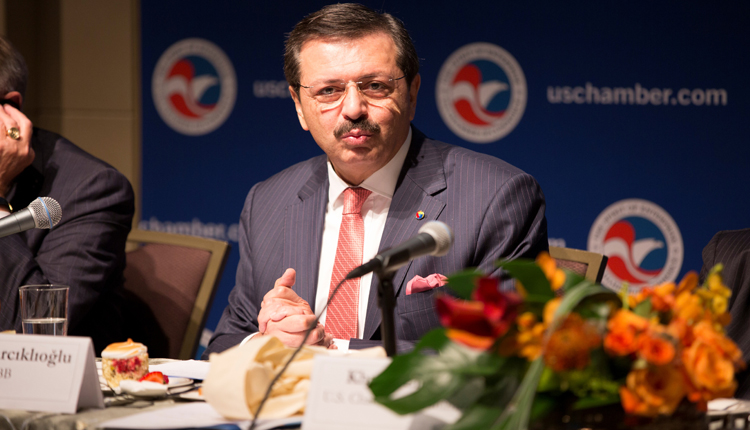Rifat Hisarcıklıoğlu, the president of the Union of Chambers and Commodity Exchanges of Turkey (TOBB), said on Friday that it was now the banks turn to lower their lending rates, after the central bank substantially cut its benchmark rate on Thursday.
The Monetary Policy Committee of Turkey’s central bank under the freshly appointed governor Murat Uysal announced on Thursday that it had decided to reduce the policy rate (one-week repo auction rate) to 19.75 percent from 24 percent, citing a moderate recovery in economic activity.
The central bank had kept the benchmark lending rate on hold at 24 percent since September, when it had hiked it by 625 basis points to prevent a full-blown financial crisis.
Hisarcıklıoğlu told pro-government Yeni Şafak newspaper that the central bank’s decision boosted the morale of Turkish businessmen, adding that they hoped rate cuts would continue in the following months.
Hisarcıklıoğlu said the central bank’s move would decrease both the funding costs of Turkish banks and deposit interest rates.
“Therefore it is now the banks’ turn. I call on them. We expect banks to shoulder the burden and reflect this cut on their lending rates,” he said.
According to Hisarcıklıoğlu by lowering their lending rates, the banks will stimulate economic activity, which in turn will encourage investments and decrease unemployment.
The Turkish economy expanded 1.27 percent in the first quarter of 2019, after two quarters of negative growth. Economists warn that Turkey might experience a double-dip recession beginning by the second quarter of 2019.
In order to prompt economic recovery, the Turkish government put pressure on private banks to come on board and help return the country to growth by offering low cost credit.
The Turkish parliament last week approved an omnibus bill which the government hopes will provide a solution to the billions of liras of bad debt weighing down Turkish banks. Some 400 billion liras ($72 billion dollars) of debt from companies caught between the country’s sliding lira and high interest rates and inflation will be restructured.
Economist Murat Muratoğlu told Ahval on Thursday that the central bank could in theory indirectly affect loans, loan interest rates, deposit interest rates, and the exchange rates by changing its benchmark rate, but this was not the case anymore in Turkey. “Banks have a limited amount of money for lending,” he said, adding that therefore loan rates would remain intact.
The central bank’s next monetary committee meeting will be held on Sept. 12.
Güldem Atabay, an economist and a contributor of Ahval, said that she expected that the central bank’s rate cuts would reach 800-900 basis points by the end of the year.
Reuters said that money markets predicted another 2 percentage points to be lopped off by the end of 2019.
Source: Ahval


